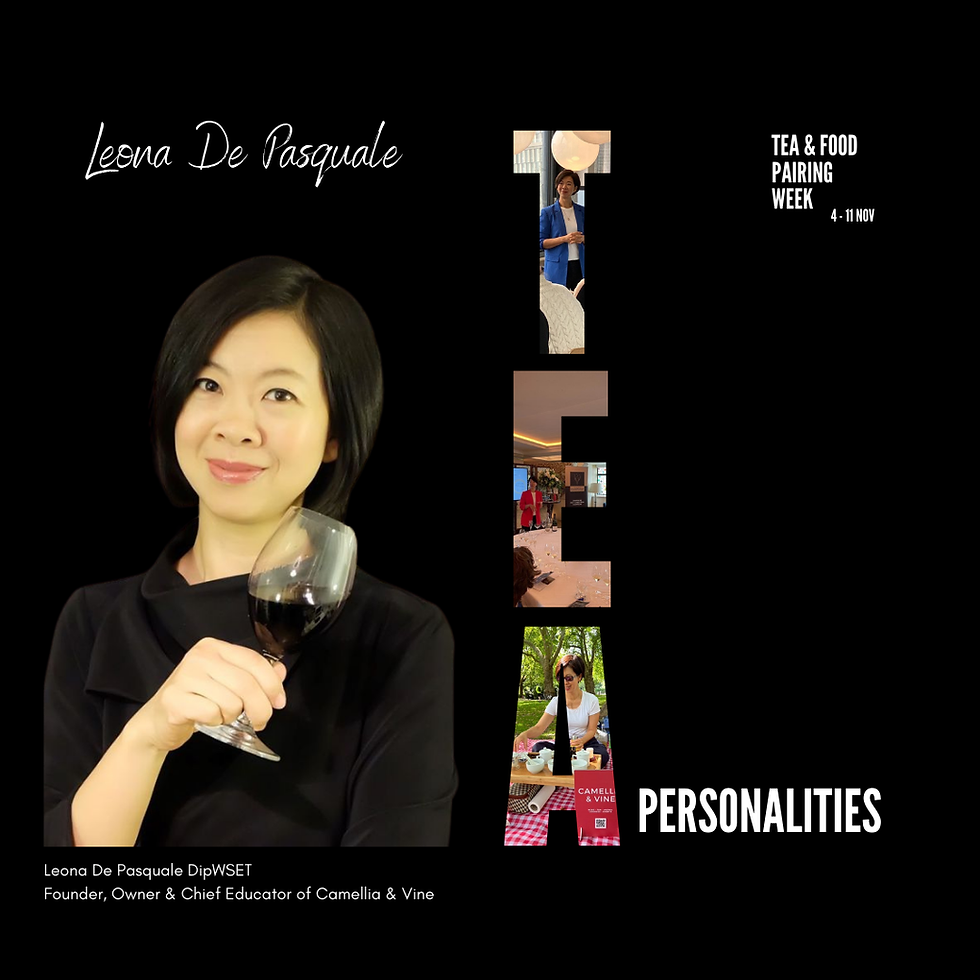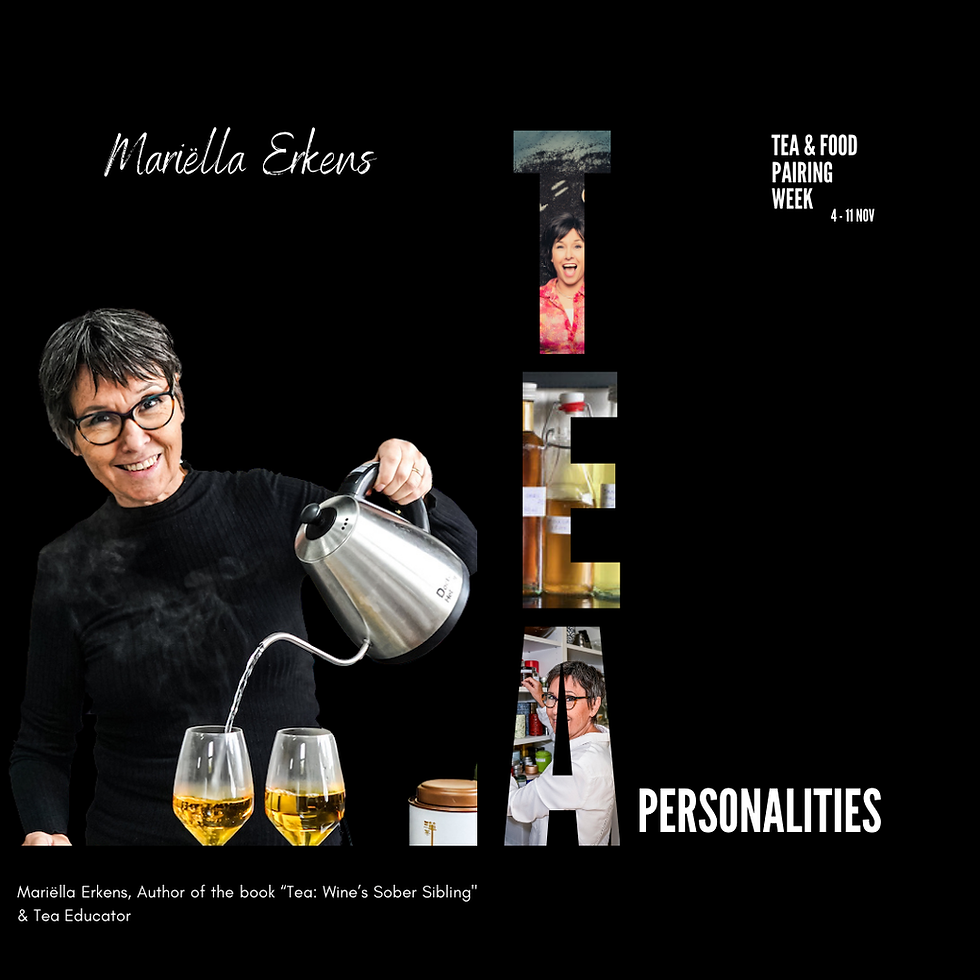Interview with Leona: Bridging the Worlds of Wine and Tea
- Lorela Lohan

- Nov 6, 2024
- 6 min read
Introduction
While visiting London, I had the pleasure of meeting Leona De Pasquale, founder of Camellia & Vine, near Yushu Tea Gallery. Leona’s story is as complex and layered as the teas and wines she works with, blending her heritage and passion for tea with her extensive experience in wine. A native of Taiwan, Leona moved to the UK in her early 30s, eventually becoming a leading voice in wine education and tea appreciation. Her work with Camellia & Vine uniquely positions tea as a beverage to be savoured and studied just like fine wine. In our conversation, Leona shared her thoughts on the intersections of tea and wine, the importance of quality, and the future of these two worlds in the hospitality industry.

Lorela: Leona, thank you so much for joining me! To start, could you share a bit about your journey and what led you to found Camellia & Vine?
Leona De Pasquale: Thank you, Lorela! I’d say my journey is rooted in my love for both tradition and discovery. Growing up in Taiwan, tea was a part of daily life, but I wasn’t initially involved in the world of wine until my mid-20s when I worked for SOPEXA, a marketing agency partially owned by the French government at that time. My first real connection with wine was with Gewürztraminer—its vibrant, fruity aroma intrigued me and opened up a new world for me. Later, when I moved to the UK, I worked as a freelance wine translator and writer, setting my goal to become a wine educator. To achieve this, I began working with UK wine importers and in the hospitality sector to gain a deep understanding of the wine industry. So that, when the time comes, I can effectively educate others. During the pandemic, I found myself with more time on my hands, which led me to explore the beautiful aromatic profiles and cultural connections that tea and wine share. It was during this period that the idea of setting up Camellia & Vine was born, with a mission to approach tea in the same way we do wine—by studying, appreciating, and elevating it within the hospitality experience.


Leona hosted three mini aroma workshops focusing on tea production methods and how they influence the aromas of tea at the Summer Tea Festival 2024 organized by London Tea Friends.
Lorela: That’s a fascinating blend of influences! What sparked your passion for both wine and tea and how do they complement each other in your work?
Leona: My passion for tea is in my roots, but wine introduced me to the power of pairing and exploring flavours more formally. Tea brings this comforting familiarity, while wine offers discovery. In my work, they complement each other through sensory analysis. Both have distinct flavour profiles that can be appreciated for their complexity, terroir, and processing methods. Tea allows for a different pace, and more contemplative, while wine can be more celebratory. Together, they balance each other and encourage people to engage their senses more fully.
Lorela: How did your experiences in Taiwan and the UK shape your approach to wine and tea pairing?
Leona: In Taiwan, tea is often seen as an everyday staple, not something that requires the same exploration and analysis as wine in the West. Interestingly, my first foray into wine was in a rather conservative context. In Taiwan, women drinking alcohol wasn’t widely accepted at that time, so I was a little hesitant to dive into it. But in the UK, wine has this presence, this cultural weight. Working with wine professionally, I began to see parallels between the two—both tea and wine are influenced by terroir, and both have aromatic profiles shaped by nature and processing. When I later reconnected with tea, I found that my palate had grown; I appreciated the nuances more deeply, and I wanted to share this with others.

Lorela: Do you believe tea should receive the same attention as wine in the hospitality sector?
Leona: Absolutely! Wine tasting is almost an intellectual pursuit—it’s about flavours, textures, endless variety, and storytelling. Tea has all of that as well, yet it’s often overlooked, especially in the UK where tea is seen as a basic drink, a staple for any time of day without much consideration of its depth. Tea deserves a more prominent place in fine dining and hospitality as a non-alcoholic but equally sophisticated option. Imagine a menu where tea is celebrated alongside wine, each tea carefully chosen to match a dish or enhance a flavour. I believe there’s a big opportunity here.
Lorela: I couldn’t agree more. What are some similarities and differences between tasting wine and tasting tea?
Leona: Both have their roots in agriculture, and both depend on expertise, terroir, and method of preparation. But while wine is often assessed visually by colour and clarity in the glass, tea involves the appearance of the leaves, which can tell you a lot about the type, quality, and origin. In terms of tasting, tea and wine both engage the palate with layers of flavour, acidity, and even astringency. The main difference is that tea’s flavours evolve across infusions, revealing new nuances each time, whereas wine reveals its full spectrum from the first sip.
Lorela: That’s so insightful! Could you share more about pairing tea with wine—how does one even approach that?
Leona: Pairing tea and wine is a fascinating art because you’re working with two very different flavour profiles and textures. When pairing, I consider complementary flavours, acidity, and weight. For example, a lighter oolong can sit well alongside a crisp white wine like Sauvignon Blanc, as they both have floral and green notes that can enhance each other. The key is finding a balance so that one doesn’t overwhelm the other and instead creates a harmonious experience on the palate.
Lorela: That sounds like a beautiful synergy. How do you think restaurants and hospitality professionals could benefit from offering tea and wine pairings?
Leona: Tea, especially when prepared thoughtfully, can elevate the dining experience, and as people are drinking less alcohol, it’s a fantastic opportunity to introduce them to tea’s potential. Offering a tea-pairing menu can set a restaurant apart. I think wine sommeliers are well-positioned to take on the role of tea sommeliers because they already have the training to understand balance and flavour complexity. With the rising interest in non-alcoholic options, teas like sparkling tea are becoming trendy, and it’s the perfect time to diversify.
Lorela: You’ve developed training courses for hospitality professionals. How do you envision this training evolving?
Leona: As tea becomes more valued, I see tea education becoming more specialized.
Currently, tea training often focuses on basic service, but I envision a future where sommeliers are trained to understand tea regions, flavour profiles, and even the science of brewing. I also think more focus on pairing skills, especially with tea and food, will become essential. Imagine a course that allows sommeliers to study tea terroirs as they would wine regions. This will enrich the dining experience for guests and give tea the elevated role it deserves.

Lorela: What advice would you give to someone just starting their journey in tea or wine professionally?
Leona: Curiosity is key. Taste widely, take notes, and pay attention to what you enjoy, but also be open to new profiles. When studying wine or tea, your palate is like a muscle that needs training. For wine, there’s often a formal qualification path, which is very valuable, but with tea, there’s more freedom to explore on your own. Find reputable resources, taste as much as possible, and develop an understanding of what makes each tea or wine unique. The pursuit of knowledge is never-ending, and it’s incredibly rewarding.
Lorela: Beautifully said, Leona. As we wrap up, are there any exciting trends in tea and wine pairing that you think could shape the future of hospitality?
Leona: Definitely! I’m seeing more interest in sparkling teas and cold-brew teas, which can offer a fresh alternative to wine pairings. I think as more consumers seek low or non-alcoholic options, tea will begin to shine as a sophisticated choice. Fine dining restaurants could soon have tea pairings as part of their tasting menus, and I believe tea sommeliers will emerge to bridge the worlds of wine and tea in a way that’s accessible and engaging.
Conclusion
Meeting with Leona was a reminder of the versatility and elegance that tea and wine bring to the table, each with its own complex story to tell. Leona’s journey shows how curiosity and dedication can blend two worlds, creating an experience that enriches both. Her vision for Camellia & Vine invites us all to look at tea and wine with a fresh perspective. As tea becomes an increasingly respected part of the hospitality scene, I hope this conversation inspires you to explore these beautiful beverages more deeply and perhaps even to consider tea as you would a fine wine—an art, a science, and a culture to savour.
All pictures were credited by Leona De Pasquale.





Comments